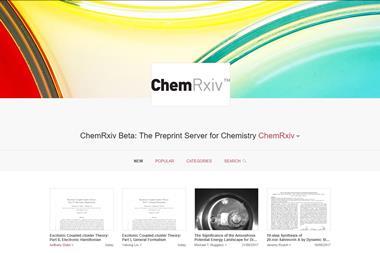The ChemRxiv preprint server, launched by the American Chemical Society (ACS) last year to share chemistry research ahead of peer review, is now co-owned by the Royal Society of Chemistry (RSC) and the German Chemical Society (GDCh). Despite support within the chemistry community for the idea of its own preprint server, there was some concern about the ACS taking the lead, particularly since the society’s journals haven’t typically published preprints.
‘ChemRxiv is officially collaboratively run by these three societies,’ announced ChemRxiv’s publishing manager Marshall Brennan at the ACS meeting in New Orleans. ‘We are really excited about what this means for our ability not just to further develop ChemRxiv, but to make sure that it is a global chemistry preprint server and develop this into something that is certainly greater than the sum of its parts.’ All three organisations will now support its financial and strategic development.
Emma Wilson, the RSC’s director of publishing, said in a statement that ChemRxiv represents ‘a fantastic opportunity to provide our global chemistry community with new tools to share and discover research’. She added: ‘It’s an important service for researchers across the chemical sciences, and cementing a partnership between three major chemical societies ensures our international community is at the heart of ChemRxiv.’
Since its launch last summer, ChemRxiv now has around 250 preprints on the server. So far, it has been able to post preprints within two days of submission.
On the up
The number of people reading the material posted on ChemRxiv is increasing too. The preprint server is on track to break 200,000 cumulative views and downloads by early April. At the end of February, that figure was around 170,000. ‘Over the course of this month, we have had a huge uptake, and it’s been great,’ Brennan tells Chemistry World. ‘Our first 100,000 views came around Christmas time, and now our second 100,000 are coming very shortly after.’
The average preprint on ChemRxiv now receives about 700 combined views and downloads within the first two weeks of its posting. ‘Not only can you get your research out quickly, but people are reading it,’ said Brennan.
Back when ChemRxiv launched in August 2017, a number of ACS journals were not on board, Brennan recalls. Now, he says, more than 80% of the ACS’s – and all of the RSC’s – journals accept preprints. The GDCh journal Angewandte Chemie has also recently started accepting preprints.
‘I am interested in seeing how things change now that Angewandte Chemie is on board and now accepting preprints,’ Brennan states. Brennan says that researchers looking to get their papers into top-tier journals like Angewandte Chemie and the Journal of the American Chemical Society (JACS) were concerned that publishing a preprint would exclude them from those journals.
Despite the pace of change, JACS is not accepting papers published as preprints. ‘JACS remains up in the air, we are hoping that they’ll change their mind soon, but that is up to them,’ Brennan tells Chemistry World.
This is excellent & I hope the societies use this as a basis for further collaboration in the future. Also come on @J_A_C_S - sort out your preprint policy - don’t be on the wrong side of this. You want to be dynamic, cutting edge, not stuffy & conservative...
— Prof. Lee Cronin (@leecronin) March 20, 2018
Lee Cronin, chair of the University of Glasgow’s chemistry department put pressure on JACS. ‘This is excellent & I hope the societies use this as a basis for further collaboration in the future,’ he tweeted. ‘Also come on @J_A_C_S – sort out your preprint policy – don’t be on the wrong side of this.’

















No comments yet